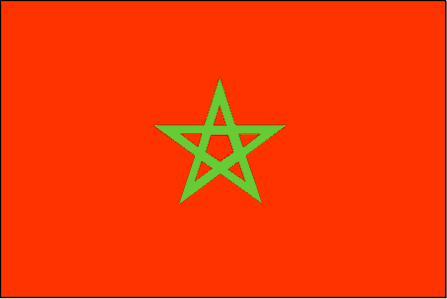Login form
Customs of Morocco
 Marriage and Family
Marriage and Family
Many marriages are still arranged by the parents of the bride and groom. When a couple is to be married, the man pays the woman’s father or eldest brother a sum of money to meet her expenses in the wedding. The bride’s family provides her with a dowry of household furnishings. Divorce, although frowned upon, is not uncommon.
Weddings signify a new union between families and are celebrated as lavishly as possible. A wedding usually lasts two days. The first day is for the bride’s female relatives and friends to come together to sing, dance, and decorate the bride’s arms and legs with henna dye. On the second day, the groom’s family and bride’s family meet to celebrate the wedding and to show that they have become one family.
The extended family is the most important element in Moroccan social life. One’s family is a source of reputation and honor as well as financial and psychological support. It is one’s duty to provide financial support to other members of the extended family when it is necessary or requested. The tie between mother and son is considered the most important relationship. Children are indulged but are also expected to contribute to the family by attaining a respectable position in society. Adult children expect to care for their aging parents when it becomes necessary. Parents do not generally interfere with the domestic or private affairs of their children’s families.
Women are traditionally restricted to domestic roles and working in the fields. However, in more modern cities such as
Eating
Mutton, beef, and chicken are the principal meats in the Moroccan diet. Traditional Moroccan dishes include harira, a tomato-based soup with beef or mutton, chickpeas, and lentils; kefta, ground beef or mutton, seasoned and cooked over charcoal; tajine, a meat stew using a variety of ingredients, often with almonds. Couscous and fish are also common. Moroccans cook fish in a variety of ways. Mint tea is the national drink. Islam prohibits the consumption of pork and alcohol, and although some men do drink alcohol, it is not entirely socially acceptable.
In most homes, the family eats the main meal of the day together. Before and after eating, each person washes his or her hands. In rural areas, a basin of water for washing is usually provided, while people in urban areas simply use the sink. Utensils are used, but traditionally Moroccans eat with their fingers—using the right hand only—from the nearest part of a large communal dish.
Socializing
Moroccans generally shake hands when greeting each other. To demonstrate one’s pleasure in seeing the other person or to show personal warmth, one might cover his or her heart after shaking hands. Children in rural areas conventionally kiss the right hand of their parents or elders to show respect when greeting them. Some people might greet close friends or relatives by brushing or kissing cheeks.
The most common general greeting is Assalam Oualaikoum (“Peace be upon you”). Sbah al Kheir (“Good morning”) and Msa al Kheir (“Good evening”) are also used. More formally, one might say Ahlan Wasahlan (“Pleased to see you”). Greetings between friends also include inquiries about each other’s well-being and that of their families. Repeated enthusiastic phrases of welcome are often extended to guests—less fervent greetings might be considered rude. It is polite to greet an acquaintance when passing on an urban street, but people do not greet strangers. In rural areas, most people know one another, so men greet men and women greet women when passing on the street. Titles are always used in formal situations and to address acquaintances. Friends address each other by first name. Elders might be referred to by a title such as Hadj, which is an honorable title reserved for those who have completed a pilgrimage to
Visiting friends and relatives frequently is considered necessary to maintain close relationships. Visiting is most popular on holidays but may occur at any time. Among family members, it is acceptable to visit unannounced. However, whenever possible, friends make arrangements in advance. This is less common in rural areas, where telephones are not always available for calling ahead.
When invited to dinner, guests are not expected to bring a gift unless the occasion is to celebrate something special. Milk and dates are served as a sign of hospitality. Guests please their hosts by complimenting them on their home. Men and women do not always socialize together. In rural areas, they more often associate separately, while couples in urban areas will socialize in mixed company. Men also often socialize in public coffeehouses, especially on weekends, holidays, or Ramadan evenings.
Recreation
Soccer is by far the most popular sport in
Holidays and Celebrations
Each year Muslims observe Ramadan, a month of fasting and prayer. During this observance, no eating, drinking, or smoking is permitted from dawn to sunset, although children, pregnant women, travelers, and those with illnesses are exempt from the fast. In the evenings, families eat together and then visit relatives or friends. Business is slower than usual during this month. At the end of Ramadan, heads of households give gifts of money or goods to the poor. Significant holidays include Aid al Saghir (the three-day feast at the end of Ramadan), Aid al Kebir (the feast at the end of the pilgrimage to
In addition, there are numerous local Moussem (religious festivals) held throughout the year around the country. Official public holidays include International New Year (1 January), Throne Day (3 March), Youth Day (9 July), Green March Day (6 November), and Independence Day (18 November).
Source: Encarta Interactive World Atlas

